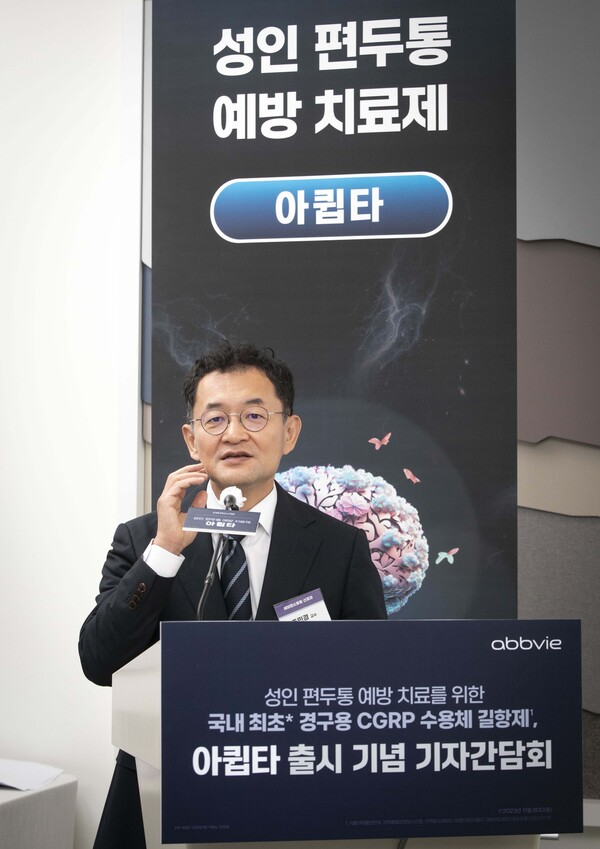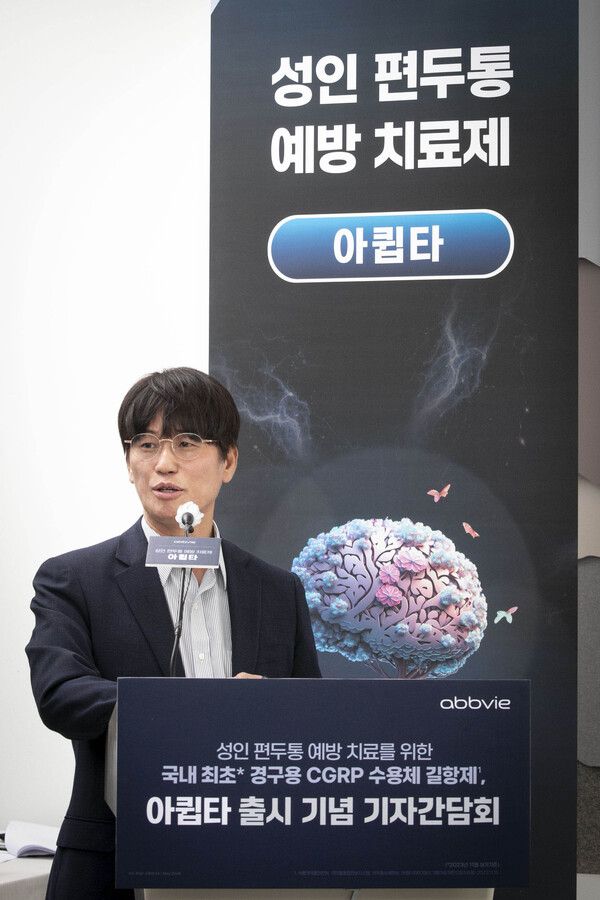AbbVie's oral calcitonin gene-related peptide (CGRP) receptor antagonist, Aquipta, was recently launched in Korea as a preventive treatment for adult migraines, addressing unmet patient needs through its convenience and short half-life.
During a press conference at Andaz Seoul Gangnam on Friday, AbbVie Korea shared Aquipta clinical findings and the current state of migraines in Korea.
Aquipta is Korea's first and only oral CGRP receptor antagonist and the first of its kind in Asia. Approved by the Ministry of Food and Drug Safety last November, it can be used for both chronic and episodic migraine patients.
At the press conference, Professors Chu Min-kyung of the Department of Neurology at Severance Hospital and Kim Byung-kun of the Department of Neurology at Nowon Eulji Medical Center highlighted the clinical outcomes and value of Aquipta while discussing the latest advancements in migraine treatment.

Professor Chu emphasized the disabling nature of migraines, describing them as a leading cause of disability worldwide due to their recurring, high-intensity headaches that often include photophobia, phonophobia, and autonomic symptoms.
"Migraines can significantly impair daily life, yet public awareness remains low," Chu said.
According to Chu, chronic migraine prevalence is between 6 percent and 11.5 percent in Korea, ranking the country sixth worldwide.
"They primarily affect those aged 25 to 55, when people are at their most economically active," Chu said. "Despite the significant impact of migraines on daily life and mental health, only 25 percent of migraine patients seek medical consultation."
Professor Chu explained that rising income levels in Korea have paradoxically led to a growing number of migraine patients and a decline in their quality of life.
"The economic losses due to migraines in Korea are the highest in Asia, with an estimated annual loss of $420 per patient," she stated. "Chu cited the low satisfaction with existing preventive medications due to their limited efficacy and tolerance as a reason for unmet needs in effective migraine treatments."

Professor Kim, another expert speaking at the event, emphasized Aquipta's reduced side effects compared to existing treatments. While previous therapies included nonspecific medications and CGRP monoclonal antibodies, their limitations have led 50-60 percent of patients to discontinue treatment within six months due to adverse effects.
"In contrast, Aquipta has shown significant reductions in the average number of monthly migraine days and acute medication usage compared to the placebo group, as demonstrated in the PROGRESS and ADVANCE clinical trials," Kim said. "During the 12-week trials, the Aquipta treatment group saw a 6.9-day reduction in monthly migraine days (MMD), compared to a 5.1-day decrease in the placebo group."
Moreover, 41 percent of Aquipta patients experienced at least a 50 percent reduction in MMD, compared to 26 percent of those in the placebo group, Kim added.
The most common adverse reactions reported were nausea (7.8 percent), constipation (7.1 percent), and fatigue/drowsiness (4.8 percent), with most cases being mild or moderate. The most common adverse reactions leading to treatment discontinuation were nausea (0.4 percent) and constipation (0.3 percent).
Kim highlighted Aquipta's immediate efficacy and long-term safety profile. "According to clinical data, Aquipta showed a reduction in migraine occurrence by 87.7 percent from the first day of treatment."
After 49 to 52 weeks of continuous usage, adverse effects remained low while efficacy improved, he added.
Kim stressed that such results give him the confidence to tell patients that the longer they take Aquipta, the better the results.
"Aquipta, the only oral CGRP receptor antagonist for adult migraine prevention, will provide a new treatment option that meets unmet patient needs through its convenience and various other advantages," Kim said.
Related articles
- AbbVie's Aquipta effective in preventing migraine in patients who failed oral therapy
- AbbVie's Aquipta gets MFDS approval to prevent migraines in adults
- Migraine is called ‘women's neurology’ because it disappears 2 years after menopause.
- Korean headache society pushes for CGRP as 1st-line migraine treatment
- Aquipta hailed as game-changer in migraine prevention at AbbVie symposium

